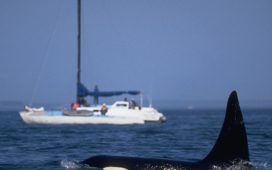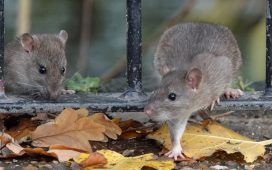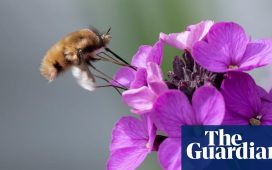The light is fading early because of the dense cloud. The weak orange sun sinks down into the distant dip on the South Downs. The paths are muddy and uneven, churned by the hooves of the British white cattle, which are now grazing on the raised flood bank. The soft chirruping whistle calls of teal carry across the marsh. I scan the grey water. With the teal are mallards, wigeons, shovelers and pintails. There’s just one bright male pintail duck, and two brown females. Larger than a mallard, the drake has a tall, elegant white neck, and a chocolate-brown head. Its grey back, covered in dark grey and pale-edged feathers shaped like knives, ends in a long, upward-pointing black tail.
I walk on across the wet marsh and see a large bird flying on the other side of the river. I splash my way to the flood bank, and climb laboriously on to it. On the other side of the wide, fast-flowing river, flapping and then gliding low above the reed and long grass, is a broad-winged marsh harrier.

There are at least three wintering marsh harriers in this area, including this young bird, which is almost completely dark brown apart from the creamy-capped head that gives the juveniles, and the similarly coloured adult females, the name “cream-crowns”. It flies slowly, thanks to its light wing-loading, which reduces the energy needed to search low like this for long periods. It constantly looks down, training its owl-like facial discs on the ground to identify prey. Time seems to slow almost to a stop with the bird’s flight. It drops down into the grass just once, lifting its wings suddenly and lowering its long legs. But it rises again quickly, without having caught anything. Eventually, it flies towards the small trees by the river bank and disappears.
The cloud has cleared enough for the small crescent moon to gleam bright. I decide to turn back before it’s too dark. Groups of Canada geese splash down noisily on the pools. The few ducks that are left are swimming to the water’s edge, seeking night-time cover. I feel more than see my way back in the gloom, my feet sinking into the soft mud, sometimes splashing ankle deep.






